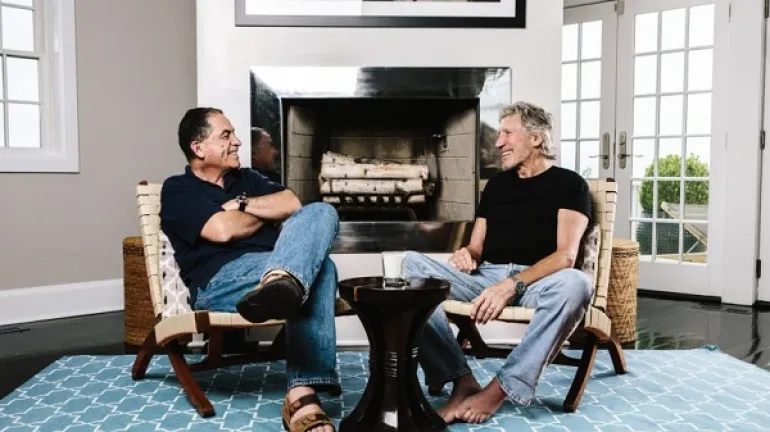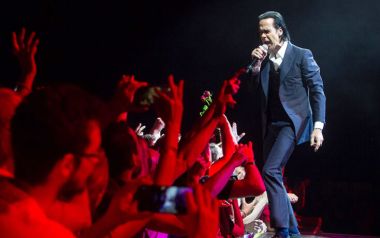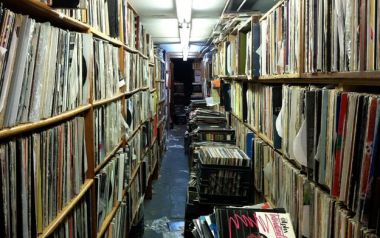Στο έντυπο του Ισραήλ Haaretz, μιλάει για την παγκόσμια περιοδεία που θα κάνει το 2016, τις πιθανότητες για επανένωση των Pink Floyd, το προσωπικό άλμπουμ που ετοιμάζει μετά από 21 χρόνια, ότι σπάνια ακούει νέες ηχογραφήσεις και πολλά άλλα.
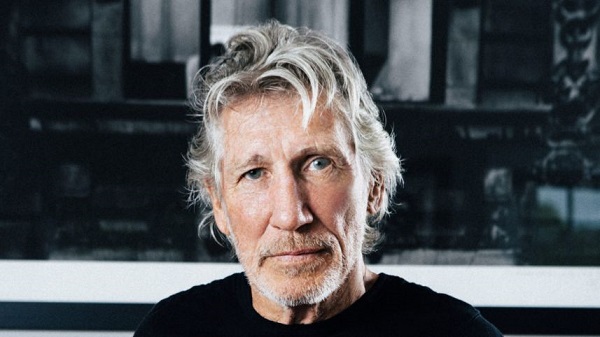
When and how did your political involvement in the Middle East begin?
“I got an offer to play in Israel, and that’s where it really started. It really started for me without thinking – because this is how naïve I was in 2006. I didn’t think about it. When my agent did the deal with Shuki Weiss and accepted the gig in [Hayarkon Park] in Tel Aviv, I was engaged in other things, to my eternal shame … but then I started getting emails.”
From whom?
“There were hundreds of different organizations, mainly from the Middle East and North Africa. But there were other places, Europeans, and people saying, ‘Are you sure about this? Do you know about this new organization?’ Because it was new in 2006, BDS. But their voice was very measured and persuasive, and I engaged in a dialogue with them.”
They were telling you not to go?
“Yes, telling me not to come. They said I’d be enabling the occupation. How naïve I must’ve been … Certainly living here in the United States – and presumably it’s the same in the U.K. – the hasbara [Israeli public diplomacy] is extremely powerful.
Eventually, I canceled that gig but went to Neve Shalom instead.”
Who suggested Neve Shalom? Whose idea was that?
“I have no idea. I can’t remember. But I must’ve done a lot of research and I heard about this place – where Jewish people and Christians and Muslims try to live together in an agricultural community, and they educate their children together through all the trials and tribulations that that kind of inclusive society necessarily demands of its citizens. It was and still is a beautiful experiment, and should be encouraged in all possible ways.
“The gig was fantastic. But – and it’s a big ‘but’ – at the end, I made a short political speech, and suddenly it was as if I was from Mars when I suggested this was the generation of young Israelis that should make peace with their neighbors. They went very, very quiet. Afterward, I thought about the implications of travel restrictions and realized it was pretty unlikely that there were any Palestinians or Arabs in the audience, and I felt really bad about that.”
But during the concert itself, what did you feel?
“Concerts are very seductive, especially if you’re standing on the stage with people going ‘Whoa, how cool are you!’”
Did you feel all the love directed at you?
“Yes, it was fantastic, I could feel it. Maybe I shouldn’t tell you this story, but I will. When I visited Jenin [in 2009], I met Ismail, the father whose son was at the center of the movie ‘The Heart of Jenin,’ about the Palestinian boy who was shot…”
And his organs were donated to Israelis.
“And they donated his organs, so it was very emotional. And then they said to me in Jerusalem, ‘Will you come and talk to the students at the film school?’ And I thought: What a great opportunity.
“So I turn up one day, and everyone’s all bubbling and there’s a room with about 150 young people and all their teachers standing around, and it couldn’t have been more welcoming. I thanked them for having me and asked what we should talk about. And they were silent, so I said, ‘Alright, I’ll tell you what we should talk about.
How many of you have seen the documentary ‘Heart of Jenin’? And they might just as well have had stainless-steel shutters behind their eyelids.
“I started to talk about it, but it was like I had turned into a Martian or something. Suddenly, you could see the distaste and horror that I would be mentioning this. And I got quite angry. I didn’t shout at them but I said: ‘There is something wrong with this picture.’ So as wonderful and as full of love as playing to that audience of young people was, this was horrific.”
‘I’m not a prophet’
Do you think you’ve found the truth concerning the Middle East?
“I don’t know, I’m not a prophet. Nobody’s handed me a bunch of tablets and said, ‘This is the truth.’ I’m having to figure this out for myself. What I do know is, whosoever it might be, from any side of any war, if anybody is dropping bombs and killing children – I know I’m on the other side. So, I live in the United States and I could not be more passionately opposed to the War on Terror – drone warfare in particular.”
And here we get to the core of the issue, because in Israel many people ask: Why Israel, when there are so many other countries that do the same?
“In the 1970s and ’80s, there was no question – we all focused on South Africa because it was the obvious place to focus. It was a place where it looked like all of us who took part in the Anti-Apartheid Movement, as it was called then, might have an effect, and might cause changes in policy in that small part of the world. Israel is that bit of the world now. Whether Israelis or anyone else like it or not, it just is.”
In Israel, you are described as not listening to both sides. Do you listen to the Israeli side?
“Okay, tell me what it is and I’ll listen. I mean, you’re the perfect person to tell me what it is, because I’ve read your work and I sense we have a great deal in common. In a way, though, maybe I shouldn’t be talking to you; maybe I should be talking to [Prime Minister Benjamin] Netanyahu. Well, obviously not. I couldn’t. Once I was put on the phone with [Israeli ambassador to the U.S.] Ron Dermer. Maybe he thought he could turn me. It was like having a conversation with a pit bull.”
What did Dermer say to you?
“He just went, ‘Hey, we all want peace,’ and I said if we can make peace then that would be fantastic. He told me peace would happen instantaneously if there was a single person on the other side he could speak to.”
And what did you say to him?
“Nothing. That’s not a conversation I should have. Where can the conversation happen? Because it’s a very difficult conversation to have. We saw the news recently with Hillary Clinton’s letter [to Haim Saban] promising to help destroy the BDS movement if she’s elected president. I said, ‘What? Is this democracy at work?! You give me money and then I destroy BDS?’ Where might there be a sensible conversation? Nobody knows what’s going to happen. But what we do know is that throwing more armaments at it is not going to help anybody.”
So maybe BDS should be aimed at the United States, and you should stop performing at Carnegie Hall?
“At some point, it might become the correct thing to try to start a boycott movement of some sort in the United States. But that time is not now. I’m part of this BDS movement, which is spreading fast through the universities – which is why people are pouring millions of dollars into the universities to try to buy [the students]. You can’t buy them! They’re young people. They’re not for sale.
“In an article I wrote a year ago, I was talking about [pro-Israel lobby] AIPAC: When Netanyahu spoke to AIPAC two years ago, he mentioned BDS 17 times in his speech. The year before that, it was never mentioned to anyone, anywhere. That’s a huge change.”
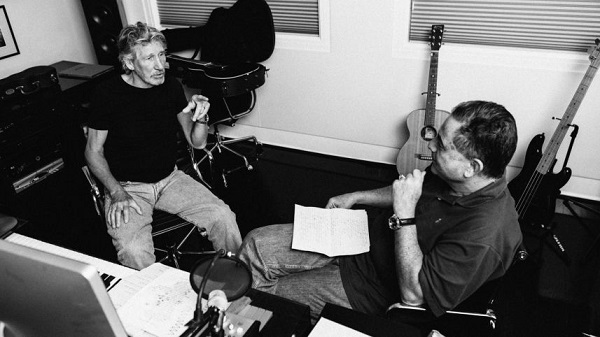
Isn’t there a danger that BDS will unite Israelis and make them even more nationalistic?
“I don’t think so. I think it will give power to Israeli people who are not happy with their domestic and foreign policy, knowing that they have friends and supporters outside the country who are standing with them and applauding them, admiring the bravery it takes to be an Israeli and to stand up for what is right and proper, humane and full of value.
“I’m not religious, but my suspicion is that, what actually relates much more to Judaism and the humane principles Judaism is based upon, is that those people are not insignificant. It is a small number, but it is a significant number. They are at least being active in some way.
“What is our alternative? Will someone give me an alternative to nonviolent protest, if we believe that the occupation is wrong and if we believe that the Palestinian citizens of Israel should operate under the same laws as Jewish citizens of Israel.”
Ending the occupation
Here we come to the question of the goals of BDS, which are presented in Israel in a vague way by the Israeli government.
Will the end of occupation mean the dismantling of BDS? Is this enough of a goal?
“Yeah, we’re talking about equality under the law.”
And the [Palestinian] Right of Return – it also includes this, correct?
“Yeah, of course.”
On the basis of equality?
“Yeah, on the basis of equality. I would say to people like Ron Dermer: ‘What’s your solution? What would you do?’ Well, we know they have one, but they still can’t quite get it out. A Greater Israel – I suspect that’s their solution, to preserve the apartheid.”
A two-state solution or a one-state solution? Do you have a preference?
“Because I’m a radical atheist, my personal preference would be a democratic, secular state with equal rights for all its citizens with a universal franchise, equal property rights, freedom to practice whatever religion you want. I’m very against theocracies.”
But it hasn’t worked in many parts of the world, including Northern Ireland.
“Okay, that’s an interesting point. I agree with you that a divided Ireland may never work. But we don’t know what is going to work. At a certain point, it was decided it was going to be a two-state solution. That that little bit [in the north] was going to stay part of the United Kingdom, and the rest was going to be a democratic republic.
“If there were two secular states, why not? I care just as much about Jewish children as I do about Arab children. I care about people not having a future where they can work, earn a living, sit around a table with their family and plan for the future, and make decisions about water or the things that are really starting to crop up all over the world with what we’re doing with the oceans. Or broader questions of conservation and ecology or global warming, or this and that. You can’t focus on any of that stuff when you’re lobbing bombs at each other over a wall. There’s no time to do anything sensible or grown-up.
“So, I don’t know what the answer is – but I know this isn’t the answer. This status quo is not the answer and you cannot, in my view, maintain a status quo that is built on the idea that it’s okay to expel people from their homes – whether it’s people’s homes in East Jerusalem now, or people who lived in villages during the Nakba [the Palestinian term for the creation of Israel in 1948]. Both things are wrong, and it’s very difficult to sustain a country based upon invasion and colonization.”
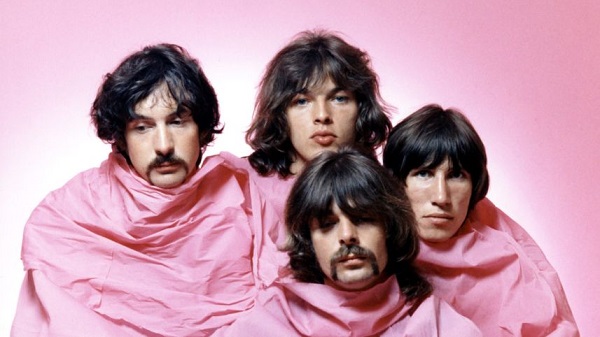
Do you understand the sentiment of many Israelis that the Jewish people have the right to their own country after everything they have gone through? And that the one-state solution for them means extermination?
“Well that’s just nonsense! People are always saying, ‘BDS is trying to delegitimize Israel.’ No, it’s not. It’s trying to stop the oppression of the Palestinian, Bedouin and other Arab peoples of the region you are oppressing. It’s trying to stop you oppressing your fellow human beings. It’s not trying to delegitimize Israel.”
An Israeli de Klerk?
So give me the scenario where you come back to perform in Israel again. What has to happen – and I mean this symbolically.
“When you and I can sit down together over a glass of wine and look each other in the eye and hold each other’s hands and go, ‘Wow! We, they, us – everybody did it.’ We can see that we did it: Everyone has equal rights, nobody is killing anybody. Then I promise you I will come and play ‘The Wall’ in its entirety.”
Will we ever reach that moment?
“I had conversations with [Mikhail] Gorbachev in 2002 or 2003. If in the mid-1980s you and I had asked, ‘Are we going to see the Berlin Wall come down within our lifetime?’ – it would have been a very difficult question to answer. But we didn’t know Gorbachev then. He is the most remarkable man – my two huge heroes since Gandhi are Nelson Mandela and Gorbachev. So who would’ve known? Things can happen. Maybe there’s a Mandela somewhere in an Israeli prison.”
Maybe we need a F.W. de Klerk?
“If you look through one of my recent op-eds, it says, ‘It may be far easier to find the Palestinian Mandela than it will be to find the Israeli De Klerk.’ But we cannot give up hope. We cannot say it’s too difficult, because even to abandon one child is one child too many. And the pictures we see coming out of Gaza are so disgusting and so heart-wrenching that those people … and I’m not saying it’s not heart-wrenching if a suicide bomber blows themselves up on a bus in Tel Aviv or Jerusalem – of course it is, it’s equally horrific.”
Should artists and academic institutions really be at the top of the boycott list?
“No. There are a number of Israeli politicians – [Shimon] Peres might well be one – who can’t come to England because they’ll be arrested the second they step foot there, as war criminals. Because there is a legal apparatus that, once you define an act as a war crime, even in the opinion of the International Criminal Court, then you have grounds for detaining somebody. There have been a number of Israeli politicians who’ve had to turn around and go home because they didn’t want to risk being sent to prison in the United Kingdom.”
Should Khaled Meshal, the political head of Hamas, be arrested if he comes to the U.K.?
“I don’t know. I would need to be legally advised to know if there is evidence that Meshal has committed war crimes. I haven’t seen evidence to that effect.”
But you’ve seen Shimon Peres commit war crimes?
“We all saw the massacres from South Lebanon.”
An Israeli music critic I know, a huge expert on Pink Floyd, wanted me to ask you this: Why don’t you criticize Hamas, too? And also, do you know what it feels like to be under the constant threat of Qassam rockets? That it’s like being in London during the Blitz?
“Absolute nonsense. I know something of the Blitz in London. Both my parents were there and worked on through the whole thing, and we’ve seen the damage. Bits of London looked a bit like Gaza does now. You can’t show me anywhere in the State of Israel that looks even faintly like that, because rockets never hit anything – or very occasionally they blow a few chunks out of a tree somewhere.
“They [the rockets] are completely useless, everybody knows it. They’re a gesture of resistance, that’s all. They might hit something, but they won’t. And if they do, they might kill one person, or two people, and very occasionally they do. But it can’t be compared with the Blitz in London. That was thousands of bombers dropping hundreds of tons of high-explosive bombs. Every night.
“But the thing about Hamas is, yeah, I condemn that. In fact, I’ve written about it often. I’ve said it is wrong, no matter how ineffective they [the missiles] are – that’s no defense for lobbing them out of Gaza. If they were directional and if they knew where they were going to land, then it would have every justification for firing them at Israeli military targets – they have been attacked, they are continuing to be attacked all the time, and they have an absolute right and duty to resist by military force. It’s explicitly defined in the Geneva Conventions and all normal laws of war: that an occupied people has an absolute right and responsibility to resist the military of the invader. Israel is the invader.”
‘Frittering away the goodwill’
What would you like to say to Israelis?
“I would like to say that in 1945, or ’47-’48, you had the goodwill, the sympathy and good wishes of the rest of the world. You were a bit like the United States after 9/11. But you’ve sadly frittered away that goodwill and you need to look at what happened in ‘47-’48, and what has happened since. But for the sake of your country and your countrymen, you need to accept that you’ve made mistakes. And you need to find the courage to live with your neighbors. You need courage. It takes courage to look at the reality, rather than trying to maintain the image of a false reality.”
But when you see what Israel is doing, don’t you feel hateful toward Israel as a whole?
“You have a very strong armament industry in Israel, it’s one of your biggest things. I hate that. But so do the United States and the U.K., and so do Belgium and Russia – and so will China, given half a chance. So the fact we’re pouring technology and investment into an arms race, it’s disgusting and is something Israel should be just as ashamed of as the U.S. Don’t start making drones and laser-guided weapons, and all that. I’m not singling Israel out, obviously.
“Israelis are just people. I can’t hate people. There are some individuals, some politicians, who crop up from time to time that are sort of hateful. But even then, somebody like your prime minister – you feel sort of sorry for him, because he looks to me like he’s the product of so much bullshit. I don’t mean to sound arrogant. I’m not holy – but I’m a lot holier than he is, that’s for sure. He made that speech in Congress, and they were all going up and down like bloody yo-yos. Talk about a response Pavlov would have been proud of.”
What do you say to those who think it’s enough to boycott the settlement project but not Israel?
“I think the more visible BDS becomes, the more likely it is to have a good effect on the eventual outcome of the situation that exists between the Israeli people and the Palestinian people. For instance, things that I’m involved in, like the cultural boycott, if I tried to persuade people not to do gigs – absolutely on the anti-apartheid model – it wouldn’t be much use for me to say to people, ‘Don’t go and do gigs in settlements.’ The settlements are a huge problem, annexing the occupied territory – or some of it – as they do. But the pressure needs to be brought to bear upon the government of Israel. And anything that shines a light on that need is good. In my view, broader is better. Restricting it just to settlement projects isn’t enough.”
What about those artists who come to Israel to perform and say, “Let’s separate music from politics”?
“They’re not actually saying, ‘Let’s separate politics from music.’ They’re actually saying, ‘I care more about my work and career than I care about these oppressed people. I’m very happy to care about the oppressed people, but not to the point where I’ll let it interfere with my career.’ That’s what they’re saying. So they’re showing themselves to be people who actually don’t care. They have no care for what’s going on in Gaza.”
What about those who say, “I’ll go and play there, and I’ll try to convince the Israelis”?
“I can look them in the eye and say, ‘You’re on a false errand, that’s not going to happen. You’re not going to change the minds of the people in the Knesset and get them to behave in a legal, proper and humane way toward the occupied Palestinians in Gaza and the West Bank.’ It will not work. It doesn’t work. It didn’t help the situation in South Africa back in the 1980s and ‘90s with Rod Stewart and Elton John and Dionne Warwick, and whoever the few others were – there were very few of them – like Queen, going and playing in Sun City.
“It helped not one jot to change the politics. What did help was that we wouldn’t go and play rugby against them. And they couldn’t come and play rugby against us. And they couldn’t compete in the Olympics. And most artists refused to go even to Sun City, and nobody went to South Africa itself. And that made a huge difference, and eventually it changed things in a big way.
“No, it has to be a political movement, and it has to grow, and it has to be thousands and thousands of people, and they have to be from all over the world – and they have to all stand together in solidarity with the occupied people. And in solidarity with the Israeli people as well, because that’s not a life any of them should be leading. It’s unhealthy for everybody. Nobody’s winning.”
What would you say to an Israeli who thinks outside intervention is anti-democratic, who says, “We should get to decide our future for ourselves”?
“What would I tell such a person? I would say to them, ‘If you actually had a democracy within the State of Israel – if there was such a thing within the Green Line, within the ’67 borders, within the whatever – if you reinstate all those houses you’ve demolished in East Jerusalem, and let the people who were living there before you threw them out come back; and if it was a democracy, and if you weren’t occupying all this other land, and so on and so forth, and if you weren’t trying to reduce the numbers of the other indigenous people who are not Jewish people in the area – if all those things pertained, well, I would absolutely applaud you and your state.’
“But that is not happening. And I suppose you could make the case for it being a Jewish state – I personally think it’s hugely dangerous to give any religion the power to control an entire country and all the people in it.”
Israelis talk about the Jewish people, not only the Jewish religion.
“Well, I’m not one of them, so it’s really none of my business, if you know what I mean. It would be like talking about Scotland – ‘Oh, we’re the Scots!’ Okay, well fine, good, okay. Obviously, the Scots at the moment are talking about whether to remain part of the United Kingdom, but they’re not going to suddenly start introducing laws where people who aren’t Scottish are going to be removed from the place or are not allowed to own property. Or, ‘I have two sets of laws: one for people who are Scots; and one for people who aren’t.’ That is not a democracy. That is an apartheid state where people are treated differently and subject to different laws, based upon their race or their religion.
“When you see the images, and you see the children’s faces, and you see the injuries, and you look at the rubble, and the filth, and the squalor, and the open sewers – you just think: I have to keep working on it.”
‘We took the music quite seriously’

Let’s talk about Pink Floyd.
“Why not?”
It seems that this chapter is totally over for you. Do you listen to Pink Floyd from time to time? To the old records? When was the last time you listened to “Dark Side of the Moon,” for example?
“Probably before I took it on the road for the last time. Just to remember exactly what the arrangements were and how we put the songs together.”
No nostalgia?
“Nostalgia? Oh yeah, of course. I mean, the work we did together from 1965 until when I left – which was 1985, so it’s 20 years – it was a lot of work, and I think a lot of it was very good. And it was certainly great fun to do the work. Work is more fun than fun. Work is the real play, certainly for me. I’m never happier than when I’m working.”
There was no way it could go on?
“No, people grow apart, you know. We were four different people – well, after Syd went crazy and then David joined the group, and then there were four of us – and we’re very different people. I made one friend in the group, who’s Nick Mason; I was never really that close to Rick Wright and David Gilmour, and we grew apart philosophically and politically – and even musically. And David and I started to really butt heads after ‘Dark Side of the Moon.’ There was a lot of this going on all the way through ‘Wish You Were Here,’ ‘Animals,’ ‘The Wall’ and ‘The Final Cut.’ So it became the only thing to do, for me to stop doing it.”
And it’s irreversible, you think?
“Yeah, of course.”
Though you did reunite that one time for Live 8, in 2005.
“Yeah, but we just about got through it. And the performance was pretty good, there was a good feeling. But it absolutely reinforced the fact that, 23 years before [when they recorded ‘The Final Cut], I’d made absolutely the right decision not to have anything to do with them ever again.”
So when did you and David Gilmour last talk?
“We were in touch last year.”
You’ve said some very tough things about him in the past. Any regrets?
“No, why should I have? I mean, after I’d left and they were going touring the three of them, that was a difficult period because they obviously were hugely successful and I confess that I never thought they’d get away with it – but they did.”
Could it be that your political activity is a kind of way to cover it up?
“Cover what up?”
The pain of being less successful than you were before. Is this a way to compensate yourself?
“I went on the road – I’ve actually been way more successful than we ever were from Pink Floyd, and certainly more than they were when they went out on the road. So there isn’t a big burden of failure floating around, and there is also that warm blanket of the love that people have for the work that we do – and that blanket covers me as well as David and Rick.”
The common sentiment is that people want to see you together again.
“Well, I find that very understandable and also supremely irritating, because I’m not attached to it and I was in it. That’s what I did for a living for 20 years, but it was a living lie for the last few years. It was no longer a healthy working relationship.”
But in the beginning, at least – was it as romantic as it seemed from the outside?
“It was just four or five young men scrabbling to try to make a few grand and get laid, like any other group. That’s what it was. We took the music quite seriously.”
Was Pink Floyd the best band of all time?
“I have no idea. I’m not interested in that.”
Can you define any other group as the most important one? As the best? The most influential?
“No I can’t. There are certain groups whose names you can just pluck out of the air, and songwriters. Like you can say John Lennon is an important songwriter, as is Paul McCartney. So is Neil Young, Bob Dylan, so is John Prine. I could probably go on for 20 minutes and then I would run out of names. Who else? There aren’t many rock ‘n roll acts I would ever listen to or care about.”
So what do you listen to?
“Nothing really, I don’t listen to music. When I’m playing gin rummy with Laurie, we listen to Chet Baker. That’s all we listen to – the same five CDs. Except the CD player’s broken now. I couldn’t get it working yesterday.”
So you’re not even up to date?
“No.”
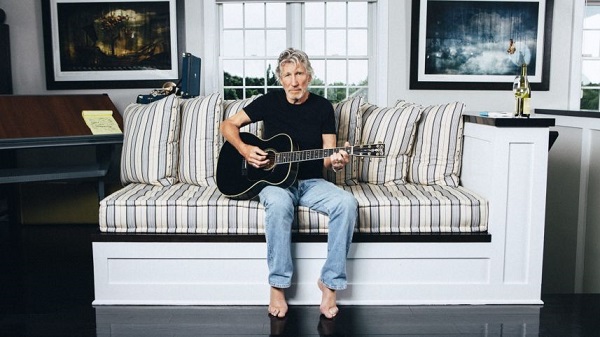
How come there aren’t iconic groups any more like Pink Floyd, The Beatles or The Rolling Stones?
“It’s an area I don’t know anything about, because I’m not interested in it, never have been. Well, maybe when I was a young teenager I was interested in pop music a little bit. Like when I was 12, and ‘Hound Dog’ came out. There was something about the romance of the instant world of fame and being a celebrity that’s appealing to small children. It very soon loses its glitter and becomes about something else.”
And then he picked up a guitar, sat down on the striped sofa in the studio, barefoot. Oblivious to the rest of the world, he began to sing “Wish You Were Here”:
So, so you think you can tell, Heaven from Hell, blue skies from pain.
Can you tell a green field from a cold steel rail?
A smile from a veil?
Do you think you can tell?
Did they get you to trade your heroes for ghosts?
Hot ashes for trees?
Hot air for a cool breeze?
Cold comfort for change? …
How I wish, how I wish you were here.
And I was left speechless.
Διαβάστε περισσότερα: Roger Waters Sets the Record Straight: I Hate Apartheid, Not Israel





